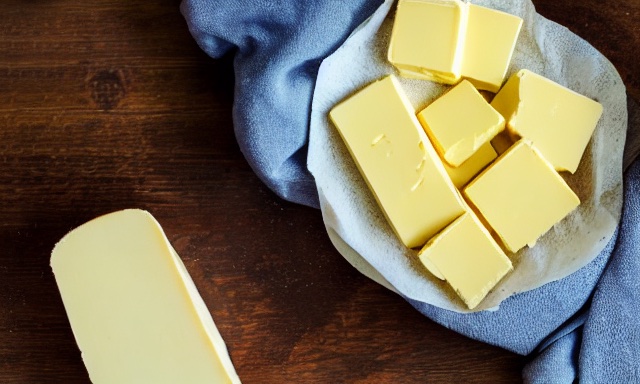Internet Asks: “Does Butter Have Carbs?”
Butter, that golden delight often spread on toast or used as a cooking staple, has been enjoyed for centuries. As you spread a dollop of butter on your morning toast or melt it into your favorite recipes, you may wonder: Does butter have carbs? Join us on a delightful journey as we explore the carb content of this beloved dairy delight.
sponsored links

Decoding the Butter Code
Before we dive into the buttery details, let's have a quick refresher on carbs. Carbohydrates are one of the three macronutrients, along with proteins and fats. They are the body's primary source of energy and can be found in various foods, including grains, fruits, vegetables, and even dairy products. But where does butter fit into this carbohydrate tale?
Does Butter Have Carbs?
Prepare for a delightful surprise: Butter is virtually carb-free! Yes, you heard it right. Butter contains negligible amounts of carbohydrates. It is composed primarily of fat, with a touch of protein and trace amounts of naturally occurring sugars.
The Science of Butter's Carb Content
Butter is made by churning cream, which separates the fat from the liquid, known as buttermilk. During this process, the majority of the milk solids, including lactose (milk sugar), are removed. The resulting golden goodness is primarily composed of fat, with only trace amounts of protein and no carbohydrates, making it a suitable choice for those following a low-carb or ketogenic diet.
Butter's Fatty Feast
Now that we've established that butter is low in carbs, let's savor the delightful benefits of this golden delight:
- Creamy Goodness: Butter adds a luscious, velvety texture and a rich flavor to both sweet and savory dishes. From fluffy scrambled eggs to melt-in-your-mouth pastries, butter is a versatile ingredient that enhances the taste and mouthfeel of your culinary creations.
- Vitamins and Minerals: While butter is primarily composed of fat, it also contains small amounts of vitamins A, E, and K, as well as trace minerals like selenium and iodine. These nutrients play important roles in supporting various bodily functions.
- Cooking Magic: Butter has a high smoke point, making it suitable for sautéing, frying, and baking at higher temperatures. Its rich flavor and ability to brown beautifully add depth and complexity to your favorite recipes.
sponsored links
The Downside of Butter
While butter can be enjoyed in moderation as part of a balanced diet, it's important to be aware of its potential downsides:
- High in Saturated Fat: Butter is rich in saturated fat, which, when consumed in excess, may increase cholesterol levels and contribute to heart disease. It is recommended to limit saturated fat intake and choose healthier fats, such as unsaturated fats found in nuts, seeds, and vegetable oils, as part of a well-rounded diet.
- Caloric Density: Butter is calorie-dense, meaning it provides a high number of calories in a small amount. This can be a concern for individuals trying to manage their weight or maintain a calorie-controlled diet. It's important to consider portion sizes and balance butter consumption with other nutrient-rich foods.
- Lactose and Dairy Allergies: Butter is derived from milk, so individuals with lactose intolerance or dairy allergies should exercise caution. While butter contains minimal lactose, it may still cause discomfort or adverse reactions in some individuals. Alternatives like clarified butter or plant-based spreads may be better options for those with dairy-related dietary restrictions.
Butter's Carb-Free Adventure
Now that we've uncovered the truth about butter's carb content, let's explore some delightful ways to incorporate it into your low-carb or ketogenic culinary adventures:
- Bulletproof Coffee: Start your day with a creamy cup of bulletproof coffee by blending butter and MCT oil into your favorite brew. It's a popular choice among low-carb enthusiasts to kick-start their mornings with sustained energy.
- Flavorful Sauces: Create delicious, velvety sauces by whisking butter into pan drippings or combining it with herbs, garlic, or lemon juice. These sauces can elevate the taste of grilled meats, roasted vegetables, or steamed seafood.
- Buttered Veggies: Add a pat of butter to low-carb steamed or roasted vegetables to enhance their natural flavors and provide a satisfying richness. Butter pairs beautifully with greens like spinach, Brussels sprouts, and asparagus.
- Herb-infused Butter: Get creative in the kitchen by making your own herb-infused butter. Mix softened butter with fresh herbs like basil, rosemary, or dill, and let the flavors meld together. Use it as a spread, a flavorful addition to grilled meats, or a topping for cooked vegetables.
Butter in Moderation
While butter may be low in carbs, it's important to enjoy it in moderation as part of a balanced diet. As with any food, portion control is key, especially when considering its fat content. Additionally, if you have specific dietary concerns or health conditions, it's always a good idea to consult with a healthcare professional or registered dietitian for personalized advice.
Conclusion
Butter is low in carbs and can be enjoyed in moderation as part of a low-carb or ketogenic diet. It adds rich flavor and creamy texture to dishes but should be consumed in balance due to its high saturated fat content. Individuals with lactose intolerance or dairy allergies should exercise caution. Remember to prioritize overall dietary balance and seek professional advice for personalized recommendations. So, enjoy the delightful possibilities of butter while keeping moderation and balance in mind.
sponsored links
References
- U.S. DEPARTMENT OF AGRICULTURE. Butter, stick, unsalted. https://fdc.nal.usda.gov/fdc-app.html#/food-details/789828/nutrients
- Harvard Public Health. Is Butter Really Back?. https://www.hsph.harvard.edu/magazine/magazine_article/is-butter-really-back/
- Health Digest. When You Eat Butter Every Day This Is What Happens To Your Body Read More: https://www.healthdigest.com/752622/when-you-eat-butter-every-day-this-is-what-happens-to-your-body/
- Anchor Butter UK. Butter basics: What is butter, how it’s made and more. https://www.anchorbutter.co.uk/food-ideas/butter-basics/
People are also reading...
Carbs In Guacamole?
Calories in a Grilled Cheese?
🍍 Are Mangoes Acidic?
Ready to level-up?
Create meal plans 10x faster, follow up with your clients through our mobile app, and never struggle with meal planning or recipe management again.